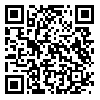1. Abbasi M, Emadian O, Abbasi GH. Effectiveness of video-based attachment-based education on parental bonding of children with behavioral disorders. Journal of Pediatric Nursing. 2022;8(3):37–46. [Persian] [
DOI]
2. Corredor GA, Justicia-Arráez A, Romero-López M, Benavides-Nieto A. Longitudinal study of the effects of social competence on behavioral problems. Procedia Soc Behav Sci. 2017;237:479–85. [
DOI]
3. American Psychiatric Association. Diagnostic and statistical manual of mental disorders. 5th edition. American Psychiatric Association; 2013.
4. Hasani B, Taher M. Effect of emotion regulation training on social problem solving, emotional knowledge and emotion regulation in preschool children. Medical Journal of Mashhad University of Medical Sciences. 2020;63(2):2483–9. [Persian] [
Article]
5. Alipour F, Nejati V, Dehrouyeh S, Moradalian F, Bodaghi E. Cognitive emotion regulation and behavioral problems in 7-12 years old children with specific learning (disorders reading, writing and mathematics deficits). Journal of Exceptional Children. 2020;20(1):87–98. [Persian] [
Article]
6. Keyvanlo S, Nariman M, Basharpoor S. The Effectiveness of Group Therapy Based on Emotional Schema Therapy (EST) on Difficulties in Emotion Regulation among Mothers having Children with Intellectual Disabilities. Journal of Applied Family Therapy. 2022;3(1):243–62. [Persian] [
Article]
7. Prout TA, Malone A, Rice T, Hoffman L. Resilience, defense mechanisms, and implicit emotion regulation in psychodynamic child psychotherapy. J Contemp Psychother. 2019;49(4):235–44. [
DOI]
8. Tabrizchi N, Vahidi Z. Comparing emotional regulation, mindfulness and psychological well-being in mothers of students with and without learning disabilities. Journal of Learning Disabilities. 2015;4(4):21–35. [Persian] [
Article]
9. Mesbahi M, Hosseinian S, Akbari Ahmadabadi A, Ghafouri S, Sayadi M. Relationship of reflective function, empathy & mindfulness among adolescent girls in Tehran city. Empowering Exceptional Children. 2021;11(4):13–24. [Persian] [
Article]
10. Torabi Sa’een N, Livarjani S, Azmoudeh M, Rezaee A. A comparison of the effect of training on life skills and mindfulness-based reducing stress upon emotional quotient in school girls. Journal of Education. 2022;38(1):151–68. [Persian] [
Article]
11. Palmer CA, Oosterhoff B, Gentzler AL. Don't worry, be happy: associations between worry and positive emotion regulation. J Cogn Ther. 2021;14(3):417–35. [
DOI]
12. Xu J, Jo H, Noorbhai L, Patel A, Li A. Virtual mindfulness interventions to promote well-being in adults: a mixed-methods systematic review. J Affect Disord. 2022;300:571–85. [
DOI]
13. Afzali L, Ghasemzadeh S, Hashemi Bakhshi M. The effectiveness of family-centered interventions on clinical symptoms of children with oppositional defiant disorder. Empowering Exceptional Children. 2016;7(4):87–94. [Persian] [
Article]
14. Singh NN, Lancioni GE, Medvedev ON, Hwang YS, Myers RE. A component analysis of the mindfulness-based positive behavior support (MBPBS) program for mindful parenting by mothers of children with autism spectrum disorder. Mindfulness (NY). 2021;12(2):463–75. [
DOI]
15. Safary S, Faramarzi S, Abedi A. Effectiveness of cognitive -behavioral play therapy on behavioral symptoms of disobedient students. Studies in Medical Sciences. 2014;25(3):258–67. [Persian] [
Article]
16. Solanki PV, Gokhale P, Agarwal P. To study the effectiveness of play based therapy on play behavior of children with Down's syndrome. Indian Journal of Occupational Therapy. 2014;46(2):41–8.
17. Wersebe H, Lieb R, Meyer AH, Hofer P, Gloster AT. The link between stress, well-being, and psychological flexibility during an Acceptance and Commitment Therapy self-help intervention. Int J Clin Health Psychol. 2018;18(1):60–8. [
DOI]
18. Achenbach TM, Edelbrock CS. the child behavior profile: II. boys aged 12–16 and girls aged 6–11 and 12–16. J Consult Clin Psychol. 1979;47(2):223–33. [
DOI]
19. Minaee A. Adaptation and standardization of child behavior checklist, youth self-report, and teacher's report forms. Journal of Exceptional Children. 2006;6(1):529–58. [Persian] [
Article]
20. Shields A, Cicchetti D. Emotion regulation among school -age children: The development and validation of a new criterion Q -sort scale. Dev Psychol. 1997;33(6):906 –16.
21. Esmailian N, Dehghani M, Fallah Tafti S. Evaluating the Psychometric Features of Emotion Regulation Checklist (ERC) in Children and Adolescents. Achievements of Clinical Psychology. 2016;2(1):15–34. [Persian] [
Article]






